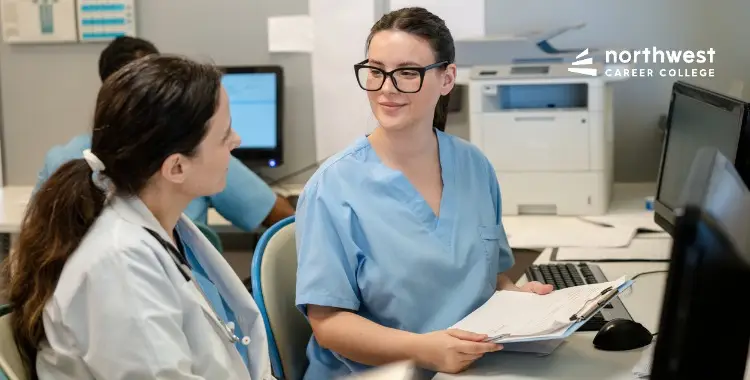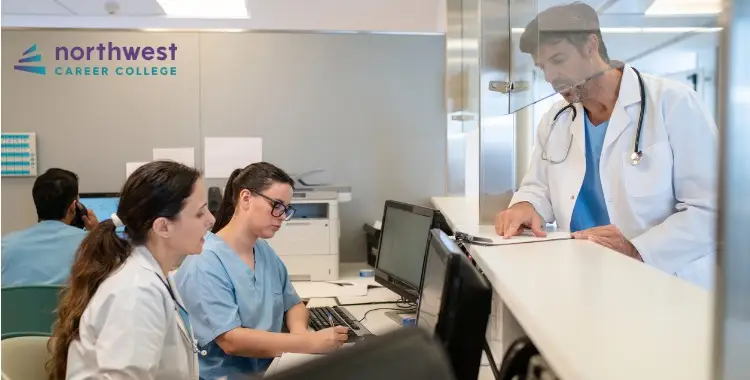Top Customer Service Tips for Medical Administrative Assistants
- Medical Administrative Assistant
- December 19, 2024
- 1.1k views
- 4 min read

Working as a medical administrative assistant means you’re the first person patients see when they walk into a doctor’s office or clinic. That makes your role super important! Not only do you help organize appointments and handle paperwork, but you’re also responsible for ensuring patients feel welcome and comfortable. Providing good customer service is critical to doing your job well.
Why is customer service so important? It helps build trust with patients, makes their visit more pleasant, and ensures the office runs smoothly. This article shares some simple but effective tips to help medical administrative assistants offer the best customer service possible.
Table of Contents
1. Warm Greetings to Patients
First impressions do count. The greeting on arrival into the office sets the tone of the experience. A friendly, warm greeting by the staff makes the patients welcome and comfortable. As a medical administrative assistant, it would be your job to set an atmosphere conducive and friendly for the patient entering the office.
Take a moment to smile and say hello. If you are busy, that is okay, but acknowledge the patient with a greeting so they know they are essential.
2. Be a Good Listener
The most critical customer service skill is listening carefully to patients. Sometimes, patients may come into the office feeling nervous or even stressed and just want to feel like they are being heard and understood. If a patient speaks with you, focus on what they say and ensure their needs are noted. Thus, good listening can solve a problem quickly and make the patients feel they are in good hands.
3. Explain in detail
Communication must be clear at all times. This pertains to all working in a medical office setting. Communicate with the patient in terms they will understand or will explain things best to them. Whether scheduling appointments, instructing about office policies, or just plain simple communication, use the most straightforward and most understandable terms.
If a patient looks puzzled, don’t hesitate to ask if they need further explanation. This will let them know you are concerned with their understanding and willing to help them.
4. Stay Cool Under Fire
Medical offices can sometimes be busy and across-the-desk stressful. You may be answering phones while helping patients and doing needed paperwork. Remember that sometimes pacing yourself will be necessary, taking each step towards solving a problem. A patient will appreciate how well you can remain calm in that hectic moment. Keeping calm allows you to resolve problems better and helps show the patients that you are in charge.
5. Organize Yourself
Organization is the key to excellent customer service. Medical administrative assistants handle a lot, from managing appointments to keeping patient records updated. The more organized you are, the more smoothly everything will run, and the quicker and more efficient your patients’ visits will be.
Use appointment scheduling software and patient record systems to stay on top. The more organized you are, the more seamless an experience you’ll be able to create for both patients and doctors.
6. Handle Sensitive Matters with Care
Upsetting or frustrating patients can occur from time to time. On such occasions, always keep calm and professional. Listen to them, show empathy, and try to find a solution. Even when it is impossible to fix the problem with a solution at that time, significant changes can be made by letting them know that they are working on it.
Dealing with difficult situations with care speaks volumes of patience and respect that will help gain trust among patients and the healthcare team.
Enroll Now at Northwest Career College Today
Northwest Career College is the perfect place to start if you’re ready to become a medical administrative assistant with top-notch customer service skills. Our Medical Administrative Assistant Program will prepare you for a rewarding career in clinics, hospitals, and other healthcare settings.
You will receive hands-on training, and experienced instructors will teach you everything you need to know to manage your medical office and provide superior patient service. You can graduate in as little as nine months; financial aid is also available.




